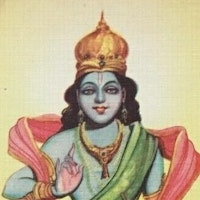When a person responds to the joys and sorrows of others as if they were his own, he has attained the highest state of spiritual union.
When a person responds to the joys and sorrows of others as if they were his own, he has attained the highest state of spiritual union.
Krishna

The Highest State
Topic: Love, Compassion, & Kindness
The infinite joy of touching the Godhead is easily attained by those who are free from the burden of evil and established within themselves. They see the Self in every creature and all creation in the Self. With consciousness unified through meditation, they see everything with an equal eye.
I am ever present into those who have realized Me in every creature. Seeing all life as My manifestation, they are never separated from Me. They worship Me in the hearts of all, and all their actions proceed from Me. Wherever they may live, they abide in Me.
When a person responds to the joys and sorrows of others as if they were his own, he has attained the highest state of spiritual union.
Krishna (/ˈkrɪʃnə/; IAST: Kṛṣṇa [ˈkr̩ʂɳɐ]) is a major deity in Hinduism. The name comes from a Sanskrit word (कृष्ण, kṛṣṇa) that means "black", "dark", "dark blue" or “the all attractive”. He is worshipped as the eighth avatar of Vishnu and also as the Supreme god in his own right. He is the god of protection, compassion, tenderness, and love; and is one of the most popular and widely revered among Indian divinities. Krishna's birthday is celebrated every year by Hindus on Krishna Janmashtami according to the lunisolar Hindu calendar, which falls in late August or early September of the Gregorian calendar.
The anecdotes and narratives of Krishna's life are generally titled as Krishna Līlā. He is a central character in the Mahabharata, the Bhagavata Purana, the Brahma Vaivarta Purana, and the Bhagavad Gita, and is mentioned in many Hindu philosophical, theological, and mythological texts. They portray him in various perspectives: as a god-child, a prankster, a model lover, a divine hero, and the universal supreme being. His iconography reflects these legends, and shows him in different stages of his life, such as an infant eating butter, a young boy playing a flute, a young boy with Radha or surrounded by female devotees; or a friendly charioteer giving counsel to Arjuna.
The Bhagavad Gita
Wilson, Andrew, editor. World Scripture II. Universal Peace Federation, 2011, p. 654 [Bhagavad-Gita 6.28-32].

Krishna
Copyright © 2017 – 2026 LuminaryQuotes.com About Us

Bhagavad-Gita 6.28-32
The Self is the Atman, or divine mind.